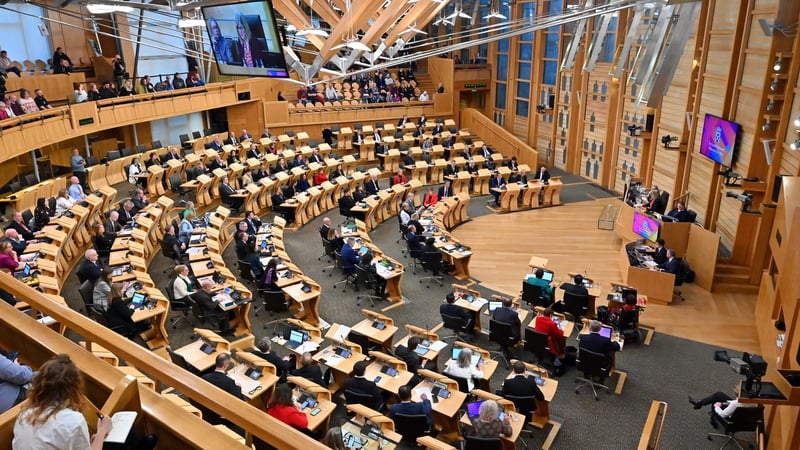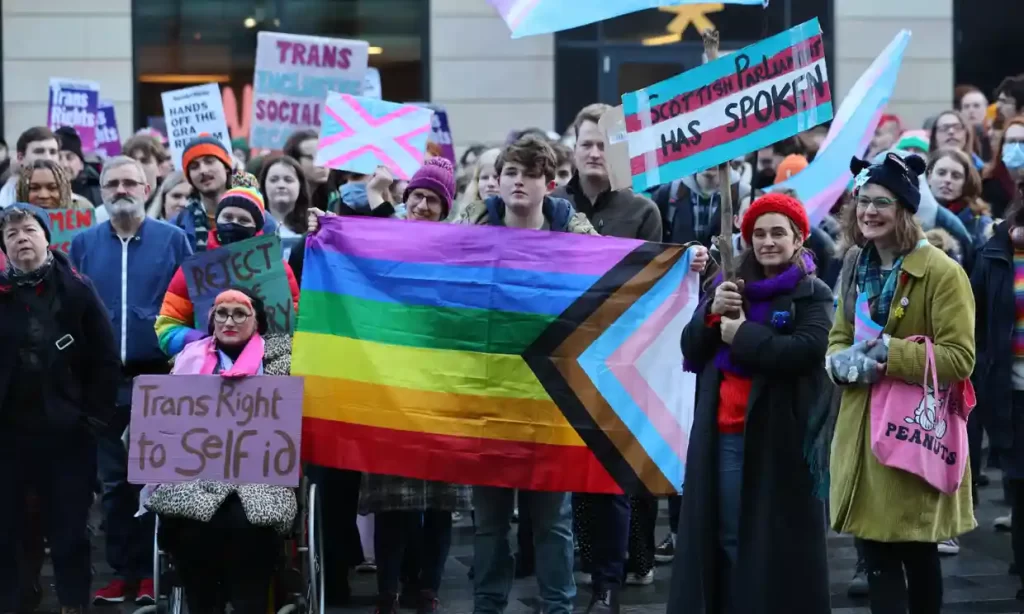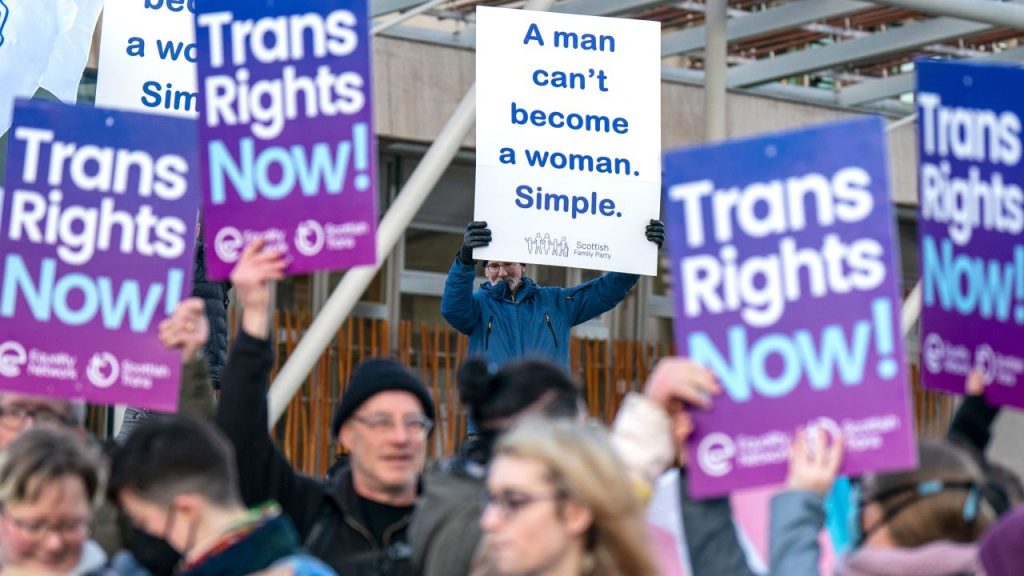Since 2004 the Gender Recognition Act (GRA) has allowed trans men and trans women in the UK to change the sex listed on their birth certificates to reflect their lived identity.
While it was a very important piece of legislation at the time, trans people, along with many human rights and equality organizations, have criticized the law as being too difficult to access and placing too much emphasis on psychiatric diagnosis and medical transition. Many other countries and states around the world have already made changes to their own laws to reflect these criticisms.
For the past 5 years, the Scottish Government has been carrying out consultations on reforming the GRA to bring it closer in line with international standards and make it easier for trans people to change the “legal sex” on their birth certificate.

On 3 March 2022, they introduced a Bill in the Scottish Parliament which would reform the law.
These proposed changes would significantly improve the current process, and bring Scotland’s gender recognition law more in line with the approach of many other countries in Europe like the Republic of Ireland, Malta, and Iceland.

Scottish Trans supports these reforms and believes they will have a marked impact on the lives of trans men and women in Scotland, who currently have to spend large amounts of time and money on a difficult, bureaucratic, and unfair process just to have the way they live recognized on some of their records.
Whilst an important step forward, the reforms proposed would still see Scotland with a gender recognition law that is far from world-leading. Other countries have been significantly more ambitious in changing their laws to ensure that all trans people can be respected and recognized as who they are.
However, the British government has blocked this Scottish bill. The UK government has used its veto power for the first time in a move that has reignited the debate over trans rights and set up a legal standoff over political autonomy between London and Edinburgh.
Alister Jack, the British government’s minister for Scotland, told the U.K. Parliament that proposed legislation would result in two different gender recognition programs in Britain and that it might lead to more fraudulent applications. He is to use a Section 35 order to prevent the Gender Recognition Reform (Scotland) Bill from gaining royal assent – the first time this has been done since the Scottish Parliament was created in 1999.
Westminster’s move has set off an immediate firestorm. Trans rights groups have condemned the move and Scottish nationalist politicians have branded Jack’s decision undemocratic. Scottish leader Nicola Sturgeon said her government is likely to challenge the veto in court. She was speaking as the UK government formally moved to block the legislation that was passed by the Scottish Parliament last month.
But the UK government says the changes could impact equality laws across Great Britain.
Scotland — which has been part of the United Kingdom for more than 300 years — has its own elected government that controls matters such as education and justice. However, London provides some funds for state spending and is responsible for issues such as defense. Advocates for Scottish independence, who include Sturgeon, have grown in prominence in recent years.

Here’s what to know about transgender rights in Britain and how we can interpret the government’s recent decision.
The Scottish Parliament passed a bill with cross-party support in December that lowers the age — from 18 to 16 — at which people can apply for a gender recognition certificate.
The bill would also eliminate the need for a medical diagnosis of gender dysphoria which can be costly and challenging to attain. Applicants above the age of 18 would be allowed to be recognized in what Scotland calls their “acquired gender” after three months of living in it; 16- and 17-year-olds would need to wait six months.
That is a change from the status quo, which requires applicants to provide two medical reports and live in their acquired gender for two years. Vic Valentine of the advocacy group Scottish Trans said, “The bill as passed would introduce a simpler and fairer way for trans men and women to be legally recognized as who they truly are, allowing them to live with the dignity we all deserve.”
Scotland is the 10th European country to pass such legislation, which would bring it closer to regulations in U.S. states such as New York, where applicants can have their gender identity legally recognized at age 17 and without the need for a medical diagnosis.

Why is the issue so contested?
Britain’s ruling Conservatives previously took a more liberal stance on the issue, but recent leaders such as Prime Minister Rishi Sunak have criticized some transgender campaigning efforts as “woke nonsense.”
Opponents of the Scotland bill argue that it could jeopardize women’s and children’s safety by making it easier for men to access single-sex spaces such as bathrooms and changing rooms. Author and Scotland resident J.K. Rowling, who is one of the bill’s most influential critics, wrote in 2020 that the bill “will in effect mean that all a man needs to ‘become a woman’ is to say he’s one.”
According to a 2022 YouGov poll, there has been an erosion in support for trans rights since 2018. The report also talks about the attention most Britons have paid to the trans rights debate and the attention span is little to none.
The report says, the debate on transgender rights is one of the foremost frontlines of the ‘culture wars’ similar to Britain’s colonial history, Black Lives Matter, and free speech in universities.
But despite Westminster’s fixation with such issues, the public themselves are far less invested. Two-thirds of Britons say they pay little attention (42%) or no attention (24%) to the debate in the media and politics about trans rights. Only one in three say they pay more attention than this, including just 8% who say they pay “a lot” of attention.
As per the same survey, while most Britons agree that people should be able to socially identify as a different gender, they oppose making it easier to be legally recognized in one’s acquired gender.
While Edinburgh has the right to legislate on gender, the British government justified its intervention on the grounds that the bill has implications beyond Scotland.
Why is the UK government getting involved?
Scotland has a devolved government, established in 1999, which means that many, but not all, decisions are made at the Scottish Parliament in Holyrood, Edinburgh.
The Scots can pass their own laws on issues like healthcare, education, and the environment, while the UK Parliament in Westminster remains in charge of issues including defense, national security, migration, and foreign policy.
The UK government can stop Scottish bills from becoming laws, but only in a few very specific cases – for example, if it believes the Scottish bill would be incompatible with any international agreements or with the interests of defense and national security, or if it believes that the bill would clash with a UK-wide law on an issue that falls outside Scotland’s powers.
Under the rules that set out how Scotland is governed, London has four weeks to review a bill after it’s passed by Holyrood, after which it is sent to the King for Royal Assent, the last formal step that needs to happen before it becomes the law.
The deadline for intervention on the new gender bill was set to expire later this week.
But many in Scotland have accused the UK government of playing politics and blocking the new bill for political, rather than constitutional, reasons.
What’s next?
The Scottish government cannot overrule the decision. If it wants to take the legislation forward, it has two options: amend the bill and bring it back to the Scottish Parliament, or challenge the UK government in court.
There is no precedent, as the UK government has never before used its power to block Scottish legislation in this way.
What are the political implications for Scotland?
London’s decision to halt the Scottish bill could further galvanize secessionist sentiment. Shona Robison, a pro-independence Scottish minister, said the move demonstrated the British government’s “contempt for devolution.” Sturgeon, the Scottish leader, suggested London might seek to similarly overrule Edinburgh on other issues.
The British government could have used less intrusive measures, such as asking the U.K. Supreme Court to intervene, if it felt Scotland had overreached, said Maugham, the lawyer. He suggested London instead chose a “nuclear option” that “marks a real deterioration in respect for the ability of people of Scotland to self-determine.”
Author
























One Response